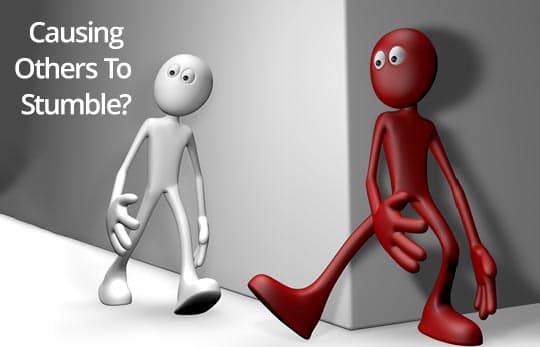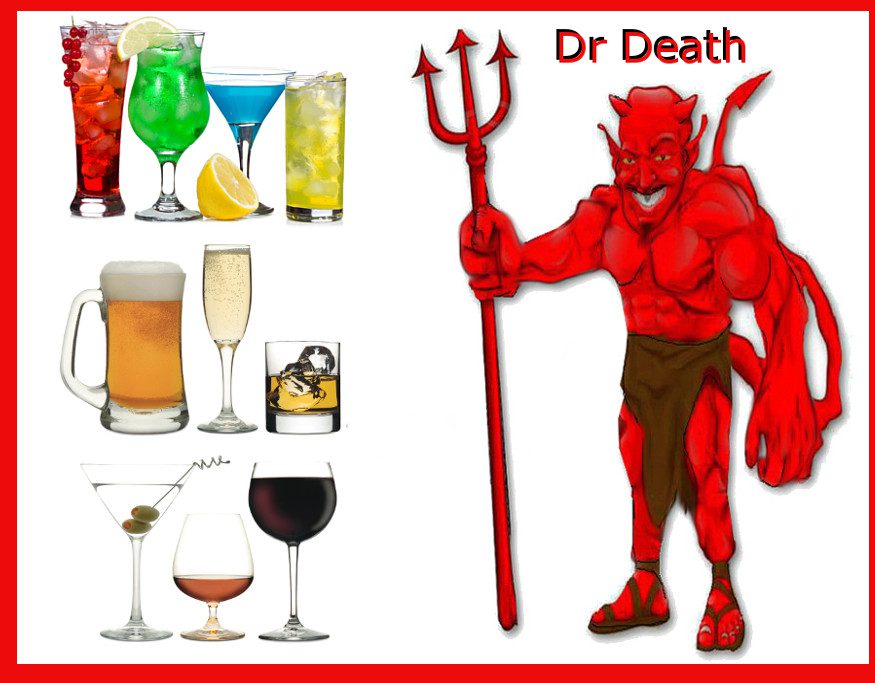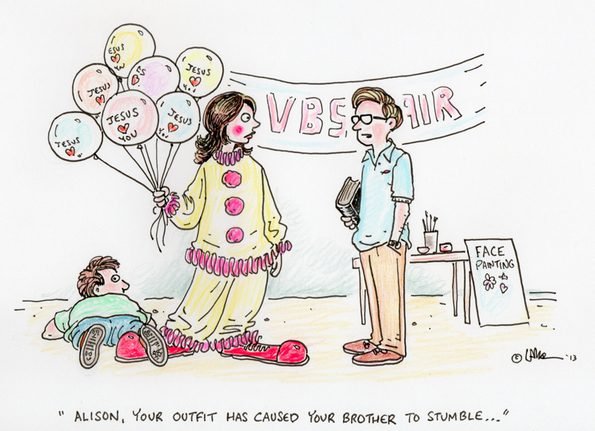
The Apostle Paul said in Romans 14:
Let us not therefore judge one another any more: but judge this rather, that no man put a stumblingblock or an occasion to fall in his brother’s way. I know, and am persuaded by the Lord Jesus, that there is nothing unclean of itself: but to him that esteemeth any thing to be unclean, to him it is unclean. But if thy brother be grieved with thy meat, now walkest thou not charitably. Destroy not him with thy meat, for whom Christ died. Let not then your good be evil spoken of: For the kingdom of God is not meat and drink; but righteousness, and peace, and joy in the Holy Ghost. For he that in these things serveth Christ is acceptable to God, and approved of men. Let us therefore follow after the things which make for peace, and things wherewith one may edify another. For meat destroy not the work of God. All things indeed are pure; but it is evil for that man who eateth with offence. It is good neither to eat flesh, nor to drink wine, nor any thing whereby thy brother stumbleth, or is offended, or is made weak.
Paul also says in 1 Corinthians 8:
Now as touching things offered unto idols.
….
As concerning therefore the eating of those things that are offered in sacrifice unto idols, we know that an idol is nothing in the world, and that there is none other God but one. Howbeit there is not in every man that knowledge: for some with conscience of the idol unto this hour eat it as a thing offered unto an idol; and their conscience being weak is defiled. But meat commendeth us not to God: for neither, if we eat, are we the better; neither, if we eat not, are we the worse. But take heed lest by any means this liberty of yours become a stumblingblock to them that are weak. For if any man see thee which hast knowledge sit at meat in the idol’s temple, shall not the conscience of him which is weak be emboldened to eat those things which are offered to idols; And through thy knowledge shall the weak brother perish, for whom Christ died? But when ye sin so against the brethren, and wound their weak conscience, ye sin against Christ. Wherefore, if meat make my brother to offend, I will eat no flesh while the world standeth, lest I make my brother to offend.
Before I talk about how Evangelical preachers use these verses to manipulate and control church members, I want to share what these verses actually mean — in context.
Paul was addressing an issue that cropped up in early Christian congregations. Church members were eating meat that had been previously offered up to pagan idols. Paul told them there was nothing inherently wrong with eating a T-bone steak previously offered up to one of the many pagan deities worshipped at that time. Mature believers knew meat was meat regardless of its provenance.
Immature believers, however, believed eating meat offered up to idols was sinful. Mature Christians eating this meat were causing them to stumble in their faith. Paul told mature believers to not eat meat offered to idols if it caused their brothers and sisters in the Lord to be offended and stumble in their walk with God.
Fast forward to 2023. A stumbling block is any behavior that causes other Christians to think poorly of you or presents a bad testimony to fellow Christians or the “world.” Evangelical preachers use “stumbling blocks” as a way to control church members’ behavior. Church rules (standards) are rigidly enforced. Congregants are reminded that participating in forbidden behaviors could cause “weak” brothers and sisters in the Lord to stumble, leading them to sin. Thus, they must refrain from certain behaviors lest weaker, immature believers (or the world, in some instances) stumble and sin.
I could give numerous examples of how the “stumbling block” theology plays out in real life, but for the sake of time, let me give readers four.
Suppose you and your family want to go to the movie theater and watch a G-rated movie. You plan to go to a multiplex that shows nine movies at a time, including R and NC-17 movies. If an immature Christian drove by the theater and saw you going into or leaving the facility, he might question whether you were watching an R or NC-17 movie. This could cause him to stumble in his walk with the Lord, so you shouldn’t go to movie theaters.
Imagine going to the local grocery store to buy beer. As you are strolling to the checkout with beer in your cart, you come upon an immature Christian who thinks drinking alcohol is a sin. Not wanting to offend such people, you should never buy beer at the grocery store.
I had a preacher friend who refused to eat at any restaurant that served alcohol. He believed that if other Christians saw him eating at a place that served alcohol, they might think he was drinking booze. Not wanting to cause his fellow Christians to stumble, he decided not to eat at any restaurant that served alcohol. My friend loved steak. Most steak houses serve alcohol. As a result, he was consigned to steak hell. He couldn’t eat at Texas Roadhouse, so his idea of a “good” steak was the packer-grade meat served by Bonanza or Ponderosa (pound-a-grossa). My friend refrained from all sorts of normal human behaviors, all because he didn’t want to offend other Christians.
Women, in particular, are subject to the “stumbling block” rule. Evangelical men are hapless, helpless horndogs who are unable to control their sexuality. Women are considered gatekeepers, tasked with keeping horny preachers, deacons, and other men from stumbling. They are reminded that they must cover up their bodies: no cleavage, no tight clothing, no short skirts, no pants that accentuate the female form. If they fail to do so, men will stumble over their dicks and try to ravage them in the pews. Thus, Sunday after Sunday, Evangelical women cover up their bodies so the minds of weak, immature men won’t be tempted to lust.
Polly and I followed the “stumbling block” rule for years. We didn’t do certain things because doing so might offend other Christians or make us look bad. Perception mattered to us. I remember when we got food stamps for the first time. We would drive to Columbus, Ohio, an hour away, so no one would see us. We took this approach to other things we didn’t think were sins. Out of sight, out of mind, we thought at the time.
The 1990s were the early days of DOS video games; games such as Commander Keen, Jazz Jackrabbit, Lost Vikings, Cosmos, and Duke-Nukem, to name a few. I am not a good game player, but I enjoyed playing the games mentioned above. Some games I wouldn’t play. Why? I was afraid that if church members saw me playing them they would think poorly of me. I didn’t want to ruin my testimony. I applied the same thinking to music. I would have loved to listen to classic rock music, but I refrained from doing so lest I caused another Christian to stumble.
Eventually, we came to the conclusion that some Christians can stumble over anything; that no matter what we did, there would always be someone offended by our behavior. This freed us to buy alcohol, attend movies, and eat at restaurants that served the Devil’s Brew. We used to not frequent grocery stores that sold alcohol or gas stations that sold pornographic magazines (yes, they actually sold them years ago). Once free of the bondage of the “stumbling block” rule, we were free to shop where we wanted and enjoy various entertainments that were previously off limits to us.
Did you attend a church that emphasized the “stumbling block” rule? Please share your experiences in the comment section.
Bruce Gerencser, 68, lives in rural Northwest Ohio with his wife of 47 years. He and his wife have six grown children and sixteen grandchildren. Bruce pastored Evangelical churches for twenty-five years in Ohio, Texas, and Michigan. Bruce left the ministry in 2005, and in 2008 he left Christianity. Bruce is now a humanist and an atheist.
Your comments are welcome and appreciated. All first-time comments are moderated. Please read the commenting rules before commenting.
You can email Bruce via the Contact Form.
Context, meat to idols
Some people will trip over everything
Give examples, beards



